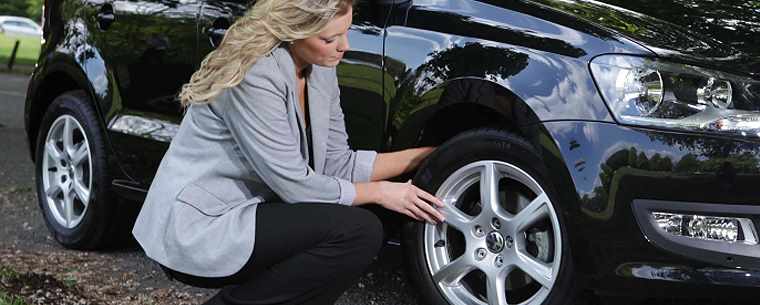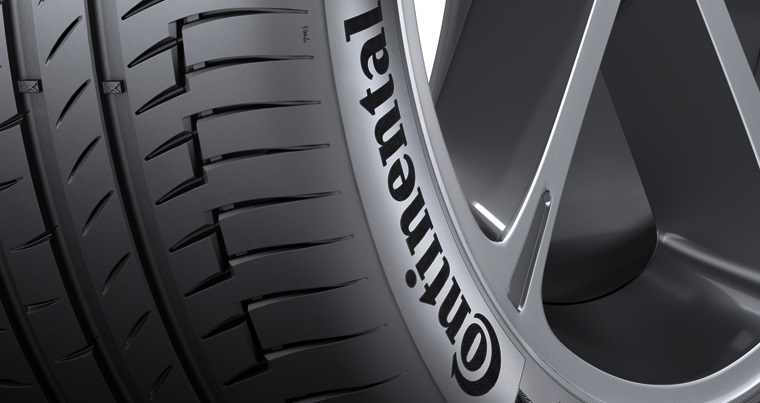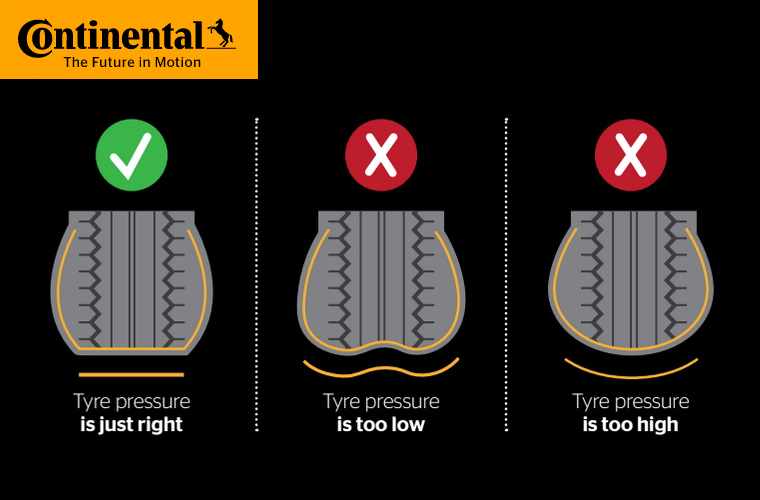Are Your Car Tyres Safe?
| Tuesday 12th June 2018 5:10pm

To keep you safe on the roads, it’s important to learn how to look after your tyres. They’re the only thing that keeps your car on the road – and exhaust replacements aren’t cheap when you get a nasty bump! So, regular checks ensure that you’re never caught with a tyre blowout. Here are our top tips for checking that your tyres are safe.
The importance of tyre tread depths
115 years ago, Continental, developed tyre treads and established themselves as a premium tyre manufacturer. These treads clear water from the surface of the road which is important for vehicle safety. Removing more water allows your tyres to grip the road better enabling you to stay in control of your car.

What tread depth should you be aiming for?
If your tyres have more tread depth, water is cleared more efficiently. New premium tyres such as Continental’s ContiPremiumContact™ 5 have 8mm of tread depth. Combined with being manufactured from the highest quality compounds, these tyres provide drivers with optimal grip, even in wet weather conditions.
Through regular use, tyre tread depth naturally reduces. In turn, this reduces the level of grip on the tyres. Cheap tyres tend to lose tread depth more quickly as they are usually made from lower-quality materials compared to premium tyres. Less grip increases the chances of an accident as stopping distances are longer. Low grip levels also makes your vehicle more difficult to control if you need to swerve suddenly.
In the UK, the legal minimum tread depth is 1.6mm. However, we recommend changing your tyres before they reach this level as tyres with a tread depth of under 3mm have significantly worse grip than tyres above this amount. At 3 mm, tyre tread wear rapidly increases, impacting stopping distances and vehicle safety. If you are unsure about the safety of your tyres and their tread depth, visit your local Kwik Fit Centre today for a free tyre check.
Tread depth & tyre wear comparison
- 8 mm: Tyre is 0% worn. Excellent
7 mm: Approximately 15% worn. Very good.
6 mm: About 30% worn. Good.
5 mm: Around 45-50% worn. Okay.
4 mm: Tyre is approximately 65% worn. Acceptable.
3 mm: Tyre is nearly 80% worn. Replace as soon as possible.
2 mm: Tyre is 95% worn. This is almost at the minimum legal limit.
1.6 mm: The tyre is now at its minimum legal limit. Replace now!
Under 1.6 mm: You are driving illegally!
To help avoid low tyre tread depths, both Kwik Fit and Continental recommend that you check your tyre treads as regularly as possible. If you don’t have a tread gauge, you can always try the quick and easy 20p test.

Make sure your tyre pressures are correct
Correct tyre pressures are crucial for driver safety. Making sure that your tyres are not under or over-inflated is important to ensure that your tyres are performing at their best. If your tyres are inflated to the correct level, you will have the best possible grip on the road.
The problem with under inflated tyres
Under inflated tyres are problematic as they make contact with the road too much. This can lead to a tyre that is too flat at the base. This means that your tyre treads will erode at a quicker rate causing a reduction in grip. Uneven tyre wear can have a negative impact on vehicle handling.
Underinflated tyres are also more vulnerable to damage. Due to these tyres being softer than they should be, objects like nails and glass are more likely to get stuck in the tyre increasing your chances of a puncture.
The problem with over inflated tyres
Over-inflated tyres can be just as dangerous as under inflated tyres as they are more likely to suffer from tyre blowout due to their rigidness. Over-inflation makes potholes and other debris on the road are more hazardous too, as well as causing excessive wear to erode the centre of the tyre and remove thread.
How to get your tyre pressures right
To find out what your ideal tyre pressures should be, check your vehicle’s fuel cap or inside the driver door. Tyre pressure readings are more accurate when your tyres are cold so it's a good idea to check your tyres before you set off on a long journey.
You can check your tyre pressures using a tyre pressure gauge. To do this, remove the tyre’s valve dust cover and attach the air hose. The hose automatically measures the tyre pressure for you. If you’re under or over inflated, expel or top up the air until the tyres are at the correct pressure.
Regularly checking your pressures is particularly important if you are planning to add a large amount of additional weight to your vehicle which puts even greater stress on your tyres.
Get in the habit of checking for tyre damage
It is important to regularly check your tyres for damage. Checking the tread depth and pressure is crucial but there are other visual inspections that you should carry out to ensure that your tyres are safe.
Your tyre sidewall can be damaged by cuts, scrapes and bulges. In addition, there is the issues of sharp objects like glass or nails which can cause punctures. These factors can put you at a greater risk of a tyre blowout, especially at high speed. Therefore, it is a good idea to inspect your tyres regularly. You can learn more about tyre damage here.
Some tyres are better than others
Premium tyre manufacturers, like Continental, are constantly investing in research and development to ensure that their tyres are as safe as possible. As a result, 1 in 3 new cars are fitted with Continental Original Equipment tyres which are designed specifically for certain car models to ensure peak performance .
Talk to Kwik Fit for tyre safety advice
If you want to find out more about which tyres you should fit to your car, head down to your local Kwik Fit centre or get in touch with one of our team online.
Any facts, figures and prices shown in our blog articles are correct at time of publication.
Featured Articles
Is it Illegal to Drive With One Headlight?
Saturday 19th July 2025
Wondering if it’s illegal to drive with one headlight? Learn about the safety risks and penalties of illegal blown bulbs and why you should fix them promptly.
Air Con in EVs & Hybrids: Experts Answer Your Questions
Monday 30th June 2025
Does air con drain EV batteries? Can you use the air con while charging an electric car? Find out the answers to these questions & more from Kwik Fit’s experts.
Why Is Your Car Making a Noise? Fixes & Tips
Friday 13th June 2025
When your car starts making unexpected noises, it can certainly be quite disconcerting; it may be nothing to worry about, but here’s what you need to know.









